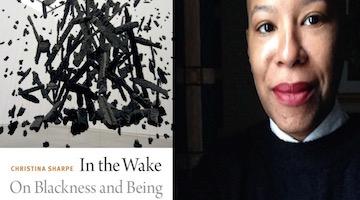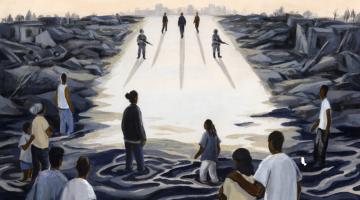BAR Book Forum: Jason Borge’s “Tropical Riffs“ and John Gennari’s “Flavor and Soul”
Our authors explore how jazz once proved the “border-hopping mobility” of African American culture, and arenas of conflict and collaboration between Blacks and Italian-Americans.
In this series, we ask acclaimed authors to answer five questions about their book.
This week’s featured authors are Jason Borgeand John Gennari. Borge is Associate Professor of Spanish and Portuguese at the University of Texas, Austin.His book is Tropical Riffs: Latin America and the Politics of Jazz.
Gennari is Associate Professor of English and Critical Race and Ethnic Studies at the University of Vermont. His book is Flavor and Soul: Italian America at Its African American Edge.
Jason Borge’s Tropical Riffs
“Much like rap and hip hop today, jazz during the 1930s, 1940s, and 1950s ‘went viral.’”
Roberto Sirvent: How can your book help BAR readers understand the current political and social climate?
Jason Borge: Tropical Riffs: Latin America and the Politics of Jazz examines the ways that Latin American musicians, intellectuals, politicians, and fans embraced, denounced, and otherwise came to terms with the jazz during the middle decades of the 20th century. Hopefully one of the take-aways from my book is to show how for quite a long time, African American popular music has been a powerful catalyst for political and cultural debate. I just watched Childish Gambino’s music video “This is America” and I was reminded of how rappers and hip-hop artists (especially when they bring their A game) can so ably channel the ambiguities and nuances of racial history and mass media through performance. Jazz is now usually seen as a niche market, popular mostly with older and wealthier audiences. What people sometimes forget is that it was once the most impactful musical expression the United States had to offer the world. Much like rap and hip hop today, jazz during the 1930s, 1940s, and 1950s “went viral”among a wide spectrum of listeners and dancers across the nation. It was also a major player in the transnational sonic sphere, so much so that many cultural nationalists in places like Argentina and Brazil saw jazz as a direct threat to quasi-official genres like tango and samba. Jazz seduced millions abroad not just by being “party music” or música bailable (Spanish for “danceable music”), but also as a formally daring, intellectually challenging idiom associated with dissident populations in the US; for example, the Black Power movement during the 1960s and early 1970s.
What do you hope activists and community organizers will take away from reading your book?
One hope of mine is that readers of Tropical Riffs will learn not to overlook the power of popular entertainment, and music specifically, to channel collective feelings and actions. (Of course, if you want to read my book you probably already believe in the power of music!). But maybe a more lasting take-away for activists is better knowledge about how and in what ways African American culture historically has travelled abroad and undergone key transformations. With this border-hopping mobility has come the potential for racial and social awareness and revolutionary change on a global scale. As I discuss in my book, jazz in the mid 20th century deeply influenced discussions of race, blackness, and sexual politics in places like Argentina, Cuba, and Brazil. At the same time, it is important to remember that just as vernacular music can be harnessed for political debate and mobilization, it can also work in the opposite direction: the sheer enormity and ubiquity of audible media means that music sometimes falls into the hands of racist groups, opportunistic autocrats, and of course multinational corporations. Not only that, but musicians themselves, now as much as ever struggling to make a living, too often find themselves at the mercy of neoliberal agents and media institutions quick to take advantage of the vitality and revolutionary cachet of African-American vernacular culture.
We know readers will learn a lot from your book, but what do you hope readers will un-learn? In other words, is there a particular ideology you’re hoping to dismantle?
One of the problems that I have encountered about jazz criticism—and music criticism generally, especially in the United States—is how little it has tended to interrogate the full political and global complexities of music. In the early 20thcentury, African American popular music was not often discussed in intellectual or even journalistic circles. It was widely seen as unworthy of serious analysis, a value judgment that revealed deep biases about race, social class, and the emerging mass media (cinema, radio, record players) on which such music depended. By mid-century, more and more critics, including academics, had begun to embrace the study of vernacular music. Yet even then, formal analysis upstaged the political questions inherent in idioms like jazz and blues—questions either avoided entirely or clouded by the racial biases of the few writers with the intellectual courage and institutional resources to take on such controversial subjects. This really began to change in the 1960s, with the work of intellectuals like Amiri Baraka. Still, in my research I have noticed an abiding tendency in the last few decades for scholars to simplify the politics of popular music to one or two issues (race, gender, etc.). One of the blind spots for mainstream jazz historians, and arguably studies of race as well, continues to be nationalism. A main premise of my book is that, by claiming jazz in all its permutations for the United States, mainstream jazz historiography has done a disservice to the music itself. Jazz as a cultural expression and a concept inescapably involves race. But it also involves nation, and in complex ways that have too often been taken for granted.
Who are the intellectual heroes that inspire your work?
One of the first books that broke the anti-political mold in jazz and music criticism was Amiri Baraka’sBlues People: Negro Music in White America (1963), a tour-de-force that explicitly framed discussions about jazz and blues in the political, racial, and social climate of the day. Based on this book alone, Baraka is certainly one of my intellectual heroes. Lesser known in the US but equally important to my work is the Cuban critic, historian and musician Leonardo Acosta, who has written extensively and incisively about the many encounters and entanglements between Cuban and US musical cultures over the decades; in Argentina, Sergio Pujol for the sheer scope and detail of his research on jazz culture in Argentina; and in Brazil, the incomparable Ruy Castro, particularly for his work on bossa nova. For some time, I have been inspired by some of the giants of postcolonial and cultural studies, especially those with deeply trans-Atlantic sensibilities like Stuart Hall and Paul Gilroy. Then I would have to mention the pioneers of Latin American cultural studies who made an interdisciplinary, intersectional cultural history like mine possible: scholars like Ángel Rama, Jean Franco, Beatriz Sarlo, Néstor García-Canclini, Renato Ortiz, José Miguel Wisnik, and Jesús Martín-Barbero.
In what way does your book help us imagine new worlds?
First of all, I should point out that Tropical Riffs does not imagine the future so much as attempt to reimagine the past. But what can we learn from this past? It is tempting to simply and uncritically celebrate jazz as a uniquely US expression that conquered the world by distilling the essence of the American—and especially the African American—spirit and experience. And this is basically the narrative you will find in Ken Burns' PBS documentary Jazz (2000), which drew largely from the views of Wynton Marsalis, Gary Giddins, Stanley Crouch and other well-known American jazz critics and musicians. I don't want to sound disrespectful here. I love jazz, truly, and I think we all are better off because of it. But because I love jazz I don't think it is wise to turn the music into some sort of national heirloom or idealized symbol of democracy. To be fair, the Jazz documentary does not completely push under the rug the racial and social strife from which jazz emerged—after all, the music was born of the segregation, economic hardship, violent conflict, and rapid change of Jim Crow America. Yet the Burns narrative almost completely ignores jazz’s non-US contributors and global reach, in spite of the fact that much of what passes for jazz these days bears the mark of Latin/o American musicians and composers like Chano Pozo, Tom Jobim, Tito Puente, Gato Barbieri, Arturo Sandoval, etc. I would like to think that my book will help readers to think twice before making unexamined proprietary claims to musical and cultural expressions—this kind of nationalism in music criticism and scholarship needs to end. But in a more general sense, my hope is that Tropical Riffs will contribute to greater transnational literacy in the area of cultural and ethnic studies.
John Gennari’s Flavor and Soul
“Think of Sal’s Famous Pizzeria in Do the Right Thing as a space of high-affect sonic performativity.”
Roberto Sirvent: How can your book help BAR readers understand the current political and social climate?
John Gennari: My book is about the fascinating and complicated intersection between Italian America and African America, a space of hopeful encounter and wary suspicion, dangerous, sometimes violent collision, and magnificent, joyous collusion. It is also about Italian racial identity itself. I’m fascinated by the ways Italian Americans have occupied a liminal and transactional space in the ethnoracial order of the United States -- at once white, near white, and dark (“the hottest of the white ethnics,” Pellegrino D’Acierno asserts, “white but temperamentally and erotically dark”); northern and southern, putative heirs to both Renaissance high culture and the criminal underworld; colorfully emotional ghetto tribalists and assimilated suburban conformists; fashion and culinary sophisticates and Jersey Shore guidos. Italian Americans, I argue, have mediated U.S. concepts of black and white, alien and citizen, outsider and insider, high culture and low culture, masculine and feminine, in ways that have decisively shaped American thinking about race and ethnicity. In the current political and social climate, it is imperative that we not fall victim to what novelist Chimamanda Adichie calls “the danger of a single story.” In the case of Italian Americans, we need to understand the history and legacy represented by figures such as Sacco and Vanzetti, Harlem civil rights and labor activist Vito Marcantonio, celebrity liberal antiracist Frank Sinatra, and Berkeley free speech activist Mario Savio. But we also must reckon honestly with the history and legacy of Italian colonialism in Africa and Italian American racism against African Americans, Latinx, and others. These multilayered histories can help us navigate the challenge posed by the extraordinary fractiousness of our current moment.
What do you hope activists and community organizers will take away from reading your book?
I devote a chapter of my book to two early Spike Lee films, Do the Right Thing (1989) and Jungle Fever (1991), that are about violent conflict as well as cultural collaboration between Italian Americans and African Americans. Those films were very much keyed to a troublesome moment in New York City ethnic/racial history, and in many ways function as allegories about specific acts of Italian racism, notably the killing of Yusuf Hawkins in Bensonhurst followed by ugly counter-demonstrations that were mounted to resist the right of African Americans and their multiracial allies to protest the killing in the streets of that Brooklyn neighborhood. But the films also richly evoke a cultural aesthetic shared by blacks and Italians. A key theme in Flavor and Soul is that vernacular spaces of black and Italian American life are highly audible and aural interlocking spaces of sonic and gastronomic expressivity, “soundful” spaces of cooking, eating, and social congress. Dinner tables, kitchens, delis, cafés, pizzerias, social clubs, barbershops, schoolyards, candy stores, street corners, front stoops -- these are spaces where Italian Americans and African Americans literally create themselves as a social body through practices of sounding, listening, performing, and consuming. Think of Sal’s Famous Pizzeria in Do the Right Thing: not just an emporium of epicurean delight, but a community center, a public square, a soapbox, a pop-up theater, a scaled-down version of the Italian piazza – in sum, a space of high-affect sonic performativity. I would hope that activists and community organizers would take from the book how important it is to recognize the possibilities inherent in such vital cultural contact zones.
We know readers will learn a lot from your book, but what do you hope readers will un-learn? In other words, is there a particular ideology you’re hoping to dismantle?
Among other things Flavor and Soul is an effort to counteract the tendency to dismiss white ethnicity as simply and always a denial or avoidance of white privilege and a cover for politics against people of color, even as I recognize that it has certainly been that. I find it ironic that critical race studies, in spite of its celebration of difference and its stated intention of deconstructing Eurocentric binaries, persists in thinking and talking about a singular reified whiteness. I propose that we try to think about race and ethnicity in ways that deepen our understanding of history and develop a future-oriented focus in which we engage dynamically and creatively in a continuing process of racial and ethnic reinvention.
Who are the intellectual heroes that inspire your work?
W.E.B. Du Bois
Vito Marcantonio
Rudolph Vecoli
Pellegrino D’Acierno
Gerald Early
Thomas Ferraro
Fred Gardaphe
David Roediger
Donna Gabaccia
Annie Lanzillotto
Joseph Sciorra
Elizabeth Alexander
James Fisher
Carlo Rotella
In what way does your book help us imagine new worlds?
We live at a time in American history when a heightened awareness of police violence against African Americans coexists with a semiofficial ethos of multiculturalism under which many of us regularly participate in dinners, festivals, and other enjoyable events designed to “celebrate our differences.” Race carries connotations of heaviness and intractability; it is a problem we need to solve, a serious conversation we need to have. Ethnicity (particularly white ethnicity) signifies pleasurable cultural immersion, renewal, discovery, feel-good heritage activity like international travel, language and cooking classes, authentic wedding music and religious rituals, arts appreciation. I would hope that my book would help intensify our focus on issues of social justice through culture rather than allow culture to serve as a reprieve from politics. This is part of what I’m proposing with my figure of the edge between Italian Americans and African Americans – and between all social groups with complicated histories of collaboration, intimacy, hostility, and distancing. That edge is sometimes smooth, sometimes serrated, but it is always there. We would be foolish to pretend otherwise. But we must also recognize the edge as a space of possibility, of creativity, of mutuality, of shared ideas and styles that radiate when different galaxies of history and self-expression meet at the crossroads.
Roberto Sirventis Professor of Political and Social Ethics at Hope International University in Fullerton, CA. He also serves as the Outreach and Mentoring Coordinator for the Political Theology Network. He’s currently writing a book with fellow BAR contributor Danny Haiphong called American Exceptionalism and American Innocence: A People’s History of Fake News—From the Revolutionary War to the War on Terror.
COMMENTS?
Please join the conversation on Black Agenda Report's Facebook page at http://facebook.com/blackagendareport
Or, you can comment by emailing us at comments@blackagendareport.com



















